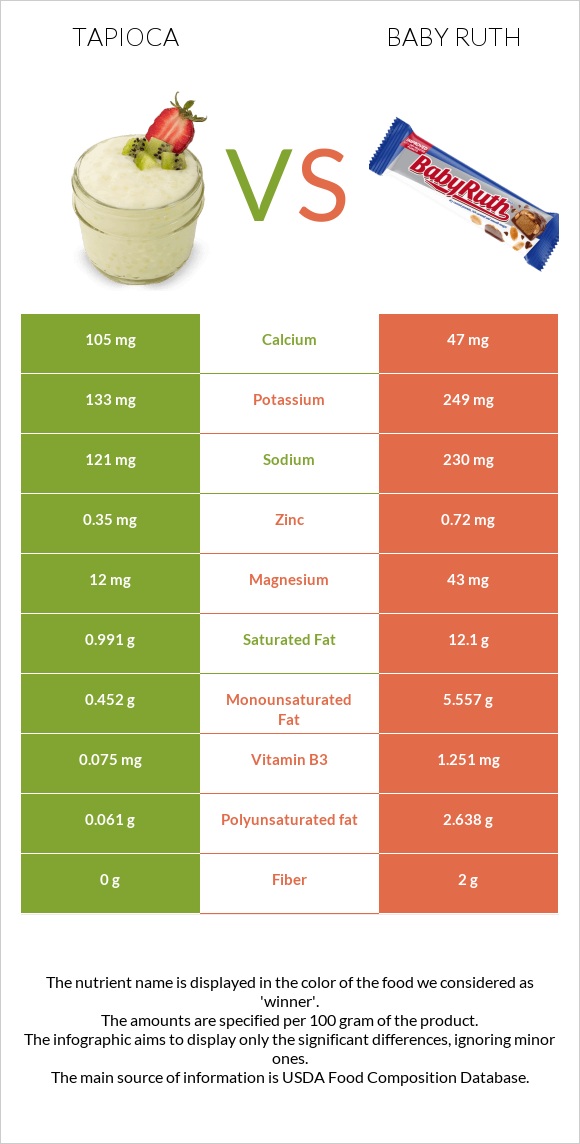Tapioca vs. Baby ruth — In-Depth Nutrition Comparison
Compare
Significant differences between tapioca and baby ruth
- Tapioca has more vitamin B12, calcium, and vitamin D; however, baby ruth is richer in copper, manganese, fiber, magnesium, vitamin B3, and iron.
- Baby ruth covers your daily saturated fat needs 56% more than tapioca.
- Tapioca contains less saturated fat.
Specific food types used in this comparison are Puddings, tapioca, dry mix, prepared with 2% milk and Candies, NESTLE, BABY RUTH Bar.
Infographic

Infographic link
Mineral Comparison
Mineral comparison score is based on the number of minerals by which one or the other food is richer. The "coverage" charts below show how much of the daily needs can be covered by 300 grams of the food.
| Contains more CalciumCalcium | +123.4% |
| Contains less SodiumSodium | -47.4% |
| Contains more MagnesiumMagnesium | +258.3% |
| Contains more PotassiumPotassium | +87.2% |
| Contains more IronIron | +950% |
| Contains more CopperCopper | +1775% |
| Contains more ZincZinc | +105.7% |
| Contains more PhosphorusPhosphorus | +14.6% |
| Contains more ManganeseManganese | +4914.3% |
| Contains more SeleniumSelenium | +25% |
Vitamin Comparison
Vitamin comparison score is based on the number of vitamins by which one or the other food is richer. The "coverage" charts below show how much of the daily needs can be covered by 300 grams of the food.
| Contains more Vitamin CVitamin C | +∞% |
| Contains more Vitamin AVitamin A | +∞% |
| Contains more Vitamin DVitamin D | +∞% |
| Contains more Vitamin B2Vitamin B2 | +18.2% |
| Contains more Vitamin B12Vitamin B12 | +316.7% |
| Contains more Vitamin B1Vitamin B1 | +93.3% |
| Contains more Vitamin B3Vitamin B3 | +1568% |
| Contains more Vitamin B5Vitamin B5 | +20.2% |
| Contains more Vitamin B6Vitamin B6 | +27.3% |
| Contains more FolateFolate | +200% |
All nutrients comparison - raw data values
| Nutrient |  |
 |
DV% diff. |
| Saturated fat | 0.991g | 12.1g | 50% |
| Fats | 1.67g | 21.6g | 31% |
| Copper | 0.012mg | 0.225mg | 24% |
| Calories | 105kcal | 459kcal | 18% |
| Polyunsaturated fat | 0.061g | 2.638g | 17% |
| Carbs | 19.56g | 64.8g | 15% |
| Manganese | 0.007mg | 0.351mg | 15% |
| Monounsaturated fat | 0.452g | 5.557g | 13% |
| Fiber | 0g | 2g | 8% |
| Vitamin B12 | 0.25µg | 0.06µg | 8% |
| Magnesium | 12mg | 43mg | 7% |
| Iron | 0.06mg | 0.63mg | 7% |
| Vitamin B3 | 0.075mg | 1.251mg | 7% |
| Calcium | 105mg | 47mg | 6% |
| Vitamin E | 0.93mg | 6% | |
| Choline | 34.9mg | 6% | |
| Protein | 2.88g | 5.4g | 5% |
| Sodium | 121mg | 230mg | 5% |
| Vitamin A | 47µg | 0µg | 5% |
| Vitamin D | 0.9µg | 0µg | 5% |
| Vitamin D | 34 IU | 0 IU | 4% |
| Potassium | 133mg | 249mg | 3% |
| Zinc | 0.35mg | 0.72mg | 3% |
| Cholesterol | 6mg | 0mg | 2% |
| Phosphorus | 82mg | 94mg | 2% |
| Vitamin B1 | 0.03mg | 0.058mg | 2% |
| Vitamin B2 | 0.143mg | 0.121mg | 2% |
| Vitamin K | 2.3µg | 2% | |
| Folate | 4µg | 12µg | 2% |
| Vitamin C | 0.7mg | 0mg | 1% |
| Selenium | 2µg | 2.5µg | 1% |
| Vitamin B5 | 0.277mg | 0.333mg | 1% |
| Vitamin B6 | 0.033mg | 0.042mg | 1% |
| Caffeine | 0mg | 4mg | 1% |
| Net carbs | 19.56g | 62.8g | N/A |
| Sugar | 54g | N/A | |
| Trans fat | 0.05g | N/A | |
| Tryptophan | 0.041mg | 0% | |
| Threonine | 0.13mg | 0% | |
| Isoleucine | 0.173mg | 0% | |
| Leucine | 0.282mg | 0% | |
| Lysine | 0.228mg | 0% | |
| Methionine | 0.073mg | 0% | |
| Phenylalanine | 0.139mg | 0% | |
| Valine | 0.192mg | 0% | |
| Histidine | 0.078mg | 0% |
Macronutrient Comparison
Macronutrient breakdown side-by-side comparison
| Contains more WaterWater | +973.1% |
| Contains more ProteinProtein | +87.5% |
| Contains more FatsFats | +1193.4% |
| Contains more CarbsCarbs | +231.3% |
| Contains more OtherOther | +37.5% |
Fat Type Comparison
Fat type breakdown side-by-side comparison
| Contains less Sat. FatSaturated fat | -91.8% |
| Contains more Mono. FatMonounsaturated fat | +1129.4% |
| Contains more Poly. FatPolyunsaturated fat | +4224.6% |





